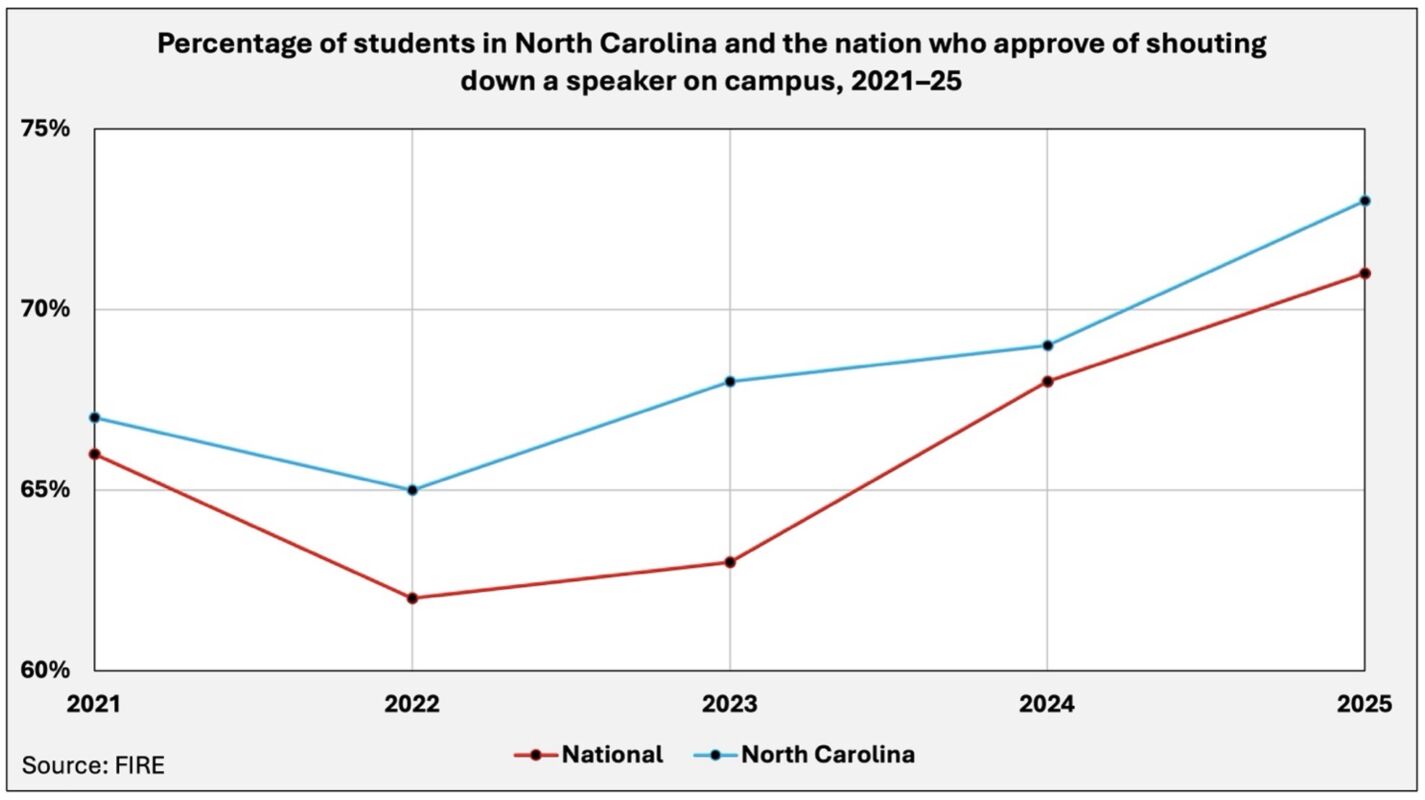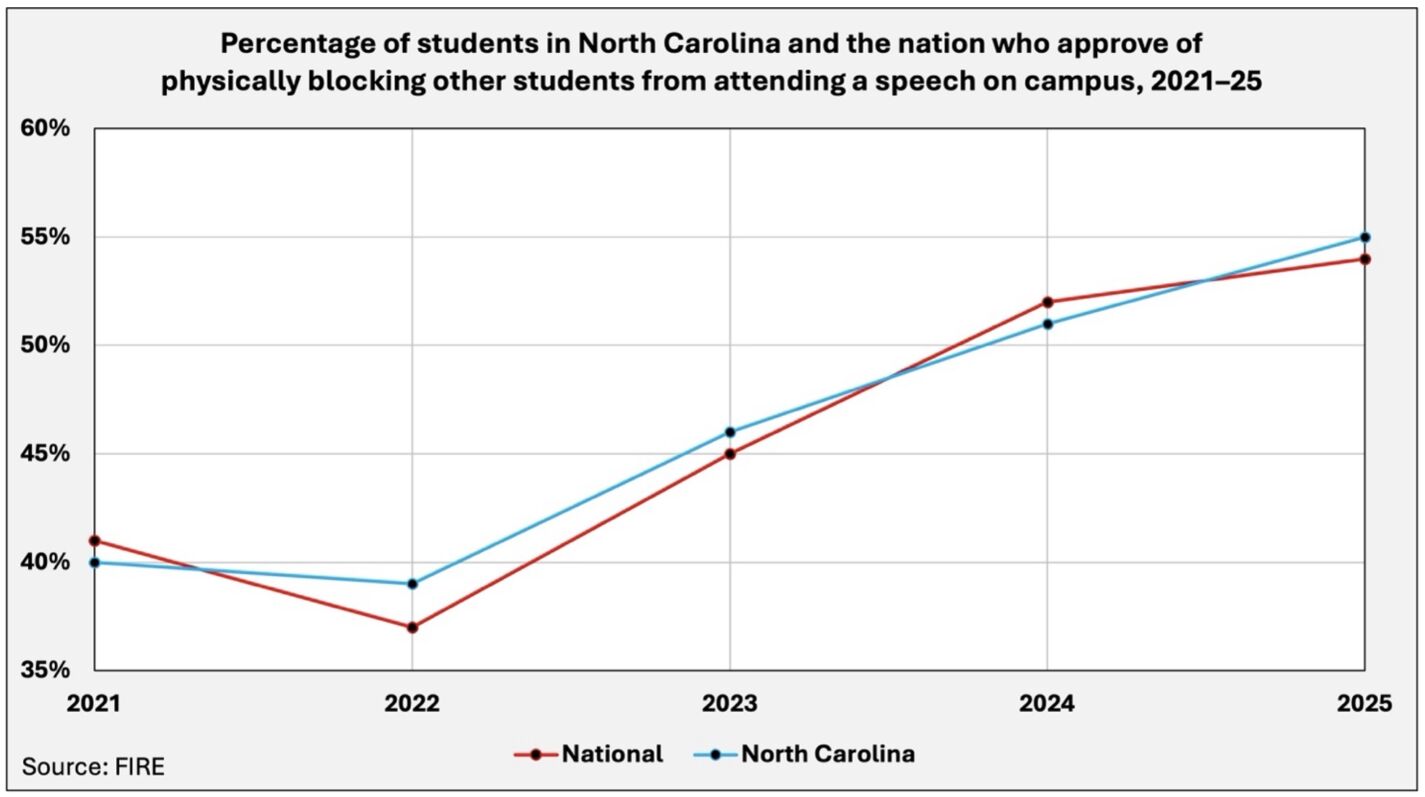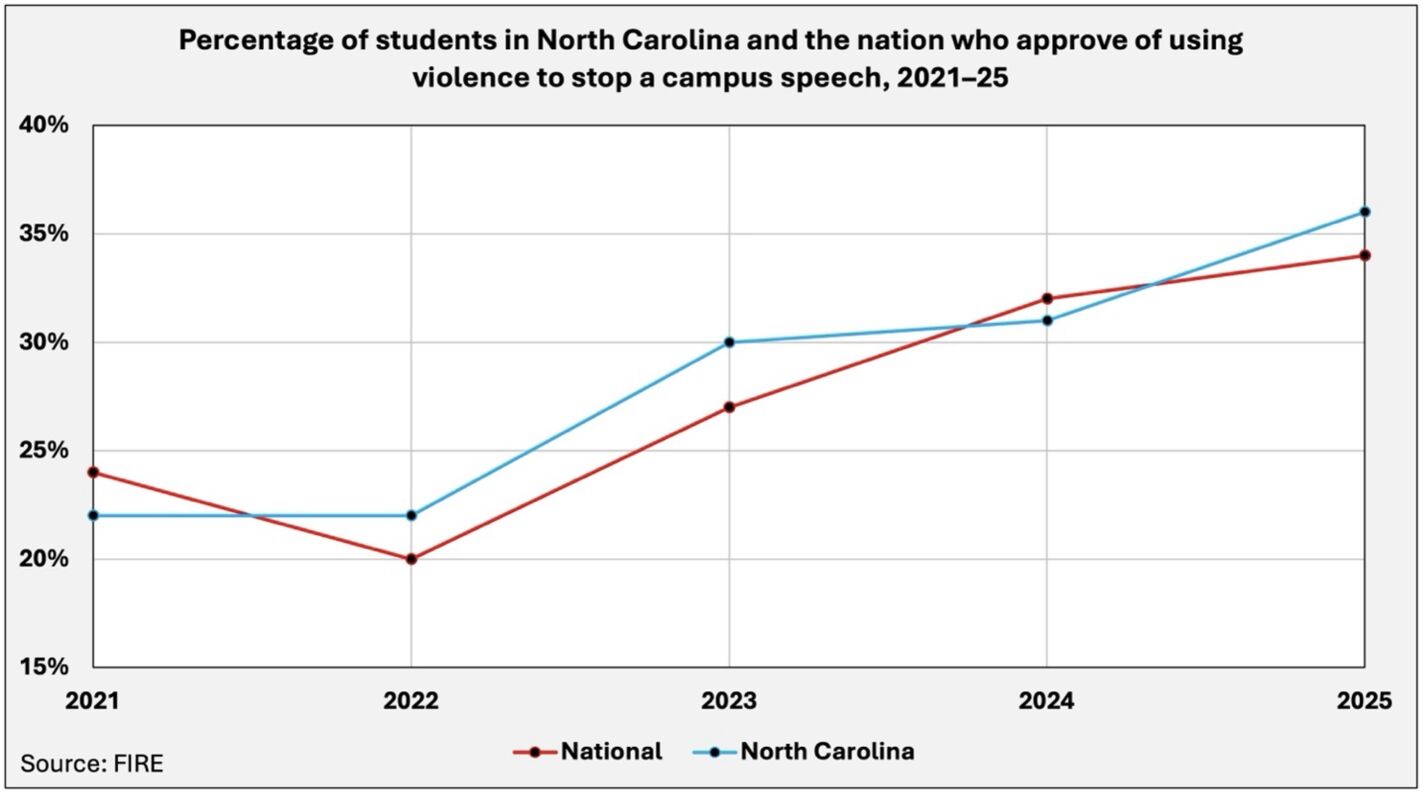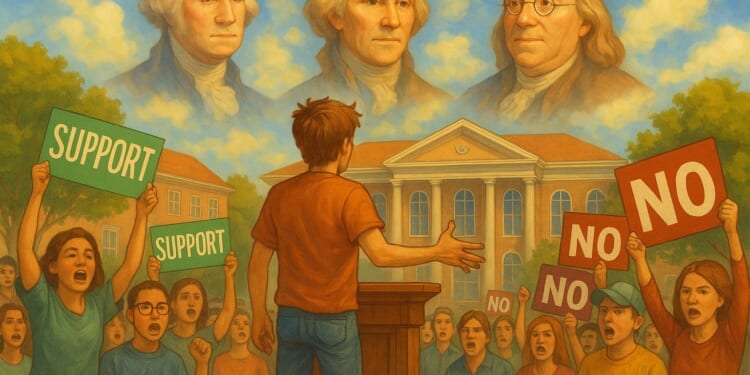- Support for the use of violence to quell free speech is on the rise among university students
- Disillusioned by debt, inflation, and cultural decay, a generation is losing faith in free expression and civic virtue
- Renewing America’s founding principles is the only path toward restoring a free and lovely country
Edmund Burke, the political philosopher, believed that love of country is essential to the survival of a free society, and that, for citizens to love their country, it must be lovely. A lovely country is one whose people cherish liberty enough to live it, gratefully, courageously, and with respect for the freedoms of their fellow citizens. Unfortunately, on college campuses today, that bond has weakened.
Across the nation, more and more students are endorsing disruptive behavior, including violence, to prevent free speech. Troublingly, in North Carolina, university students report accepting the use of force to quell speech at a higher rate than even the national average.
The Foundation for Individual Rights and Expression (FIRE) conducts an annual survey of tens of thousands of university students from hundreds of schools nationwide to gauge their views on freedom of speech, particularly on their respective campuses.
One category within the survey, called “Disruptive Conduct,” asks students, “How acceptable would you say it is for students to engage in the following actions to protest a campus speaker?” The actions include:
- Shouting down a speaker to prevent them from speaking on campus
- Blocking other students from attending a campus speech
- Using violence to stop a campus speech
Nearly 3,000 of the survey respondents in 2025 attended North Carolina universities. They included the University of North Carolina at Chapel Hill, North Carolina State University, East Carolina University, the University of North Carolina at Charlotte, Appalachian State University, North Carolina A&T State University, the University of North Carolina at Greensboro, Duke University, Wake Forest University, and Davidson College.
The charts below depict the percentage of students who reported approving of specific forms of disruptive conduct at least rarely on campus.
From 2021 to 2025, the share of university students nationwide who endorsed shouting down a speaker to prevent them from speaking on campus increased from 66 percent to 71 percent. Meanwhile, in North Carolina, the rate of students in favor of such disruption jumped from 67 percent to 73 percent. Stated bluntly, nearly three out of four university students in North Carolina apparently believe it’s acceptable to throw a tantrum when presented with ideas they disagree with in order to silence that opposing viewpoint.

During the same period, the share of university students nationally who reported support for blocking other students from attending a campus speech increased from 41 percent to 54 percent. In North Carolina, the rate leaped from 40 percent to 55 percent. Stated simply, more than one in two university students in North Carolina apparently believe it’s acceptable to create a human barricade, in a childish act resembling a “Red Rover” line, to prevent their classmates from hearing ideas they disagree with.

This rise in just four short years in students accepting violence to quell speech is particularly alarming. Nationwide, the share of students who reported support for violence to stop a campus speech surged from 24 percent to 34 percent. At the same time, in North Carolina, the rate skyrocketed from 22 percent to 36 percent — a telling admission that more than one in three students view physical aggression as an appropriate response to ideas they disagree with.

Consider those findings with that of a 2024 survey conducted by College Pulse. Titled “Losing America’s Memory 2.0,” the survey revealed that 57 percent of university students would “flee the country” if the United States were invaded, including 40 percent of males.
Taken together, these findings paint a troubling picture: a generation willing to strike their fellow Americans over words, yet unwilling to stand up for their country, its freedoms, or its most vulnerable from foreign threats.
Such attitudes suggest a deep civic decay. When a society’s educated young no longer believe in open dialogue or the preservation of their country, the foundations of the nation are beginning to crack.
To be clear, this generation’s disillusionment is not of its own making. For years, in classrooms across the country, students have learned more about America’s failures than its founding principles.
Parents, often stretched thin, too often have traded vigilance for convenience, letting television and tablets shape the moral imagination of their children. Pop culture and social media have finished the job — feeding young minds a steady diet of promiscuity, violence, and anti-Americanism, all without the grounding of history or faith in anything enduring. Furthermore, the lockdowns, school closures, and media-driven panic over Covid-19 during these students’ formative years deprived many of critical opportunities for social development.
When these students finally reach college, the universities that should complete their civic education often fail them, too, preferring ideological conformity and bureaucratic comfort over intellectual challenge. And beyond the classroom, the nation they inherit is in degeneration.
Compared with young adults 25 years ago, today’s students face much worse economic hurdles. From 2000 to 2024, median household income increased from $41,990 to $83,730, or approximately 99 percent, but the median sales price of a house boomed from $167,550 to $418,975, or roughly 150 percent. The average annual cost of tuition and fees at a four-year public university nearly tripled.
Add in the crippling cost of health care and the fact that they and their children will have to pay for a daunting national debt that short-sighted politicians recklessly accumulated, and the discontent among students, though misdirected, starts to make sense.
These students were promised opportunity but handed instability; they were told they were free, yet rarely shown what freedom requires.
Civic renewal can only come from rekindling the moral imagination of our founding principles. That begins with families, schools, and communities that teach gratitude for the freedoms we inherit and the duty to preserve them. As Burke wrote, “To make us love our country, our country ought to be lovely.”











